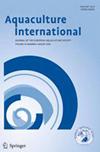The antifungal efficacy of Satureja bachtiarica and Achillea talagonica against Saprolegnia parasitica infection in rainbow trout (Oncorhynchus mykiss)
Abstract
The rising prevalence of fungal infections in aquaculture, coupled with the environmental and health risks posed by chemical antifungal agents, highlights the need for sustainable alternatives. This study investigates the antifungal efficacy of ethanolic extracts from Satureja bachtiarica and Achillea talagonica against Saprolegnia parasitica isolated from rainbow trout (Oncorhynchus mykiss) eggs. The primary phenolic compounds in the extracts were identified and quantified using high-performance liquid chromatography (HPLC). In vitro assays were conducted to determine the minimum inhibitory concentration (MIC) and minimum fungicidal concentration (MFC) of each extract. Subsequent in vivo experiments assessed the efficacy of the extracts in preventing fungal infection and transmission in fertilized trout eggs. Chemical analysis revealed that S. bachtiarica extract contained 270 mg/100 g of rosmarinic acid, while A. talagonica extract contained 680 mg/100 g of chlorogenic acid. The MIC and MFC of S. bachtiarica extract were 31.2 µL/mL and 62.5 µL/mL, respectively; those of A. talagonica extract were 62.5 µL/mL and 125 µL/mL. In vivo results demonstrated that S. bachtiarica extract significantly reduced fungal transmission from infected to healthy eggs and inhibited S. parasitica colonization in fertilized eggs, outperforming the chemical antifungal agent formalin. In contrast, A. talagonica extract exhibited antifungal effects only in vitro and showed no significant efficacy in vivo. These findings support the potential application of S. bachtiarica extract as a natural and environmentally friendly alternative for controlling fungal infections in aquaculture. Further research is warranted to optimize dosage regimens and evaluate the long-term impacts on fish health and aquatic ecosystems.

 求助内容:
求助内容: 应助结果提醒方式:
应助结果提醒方式:


